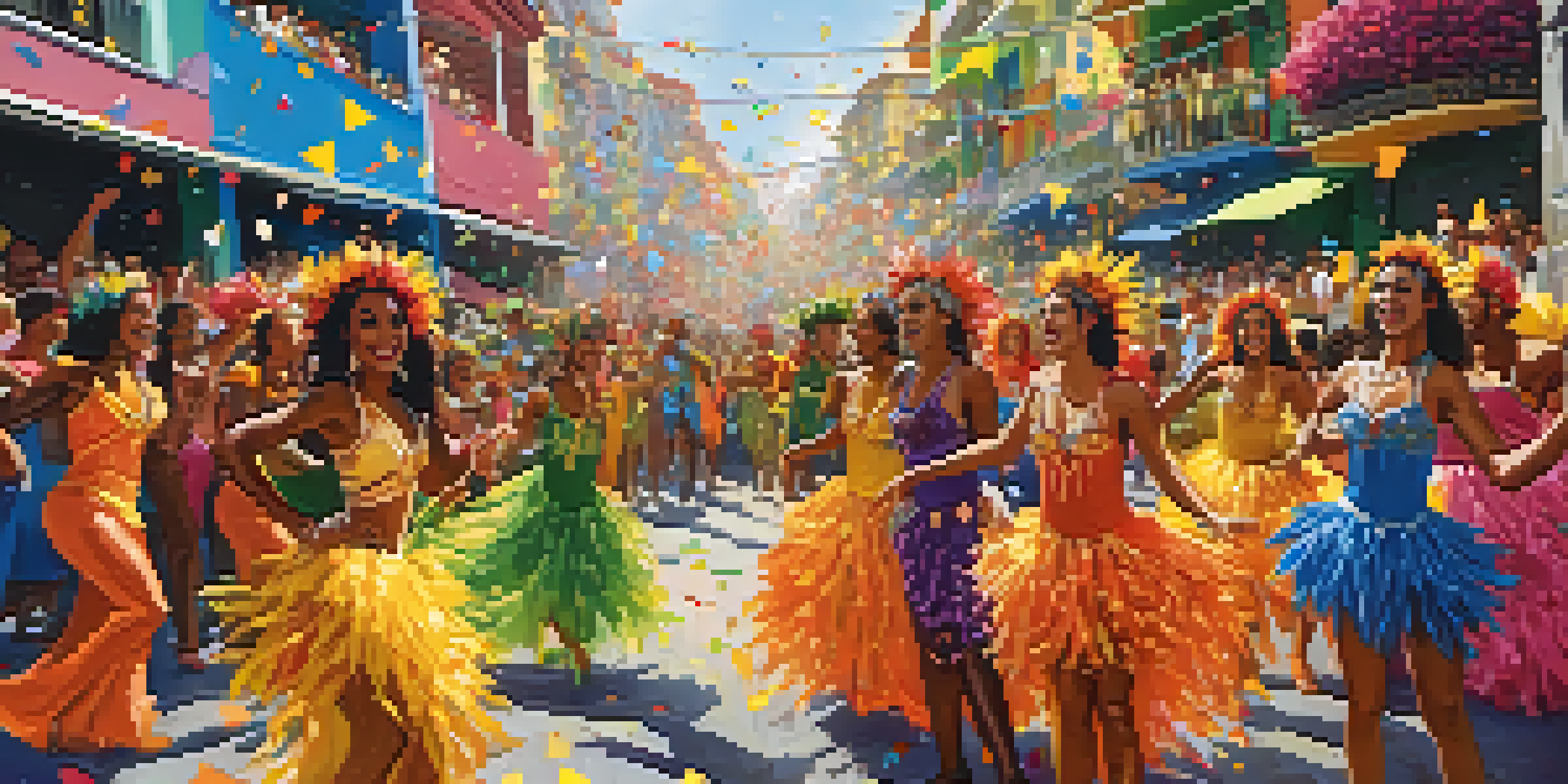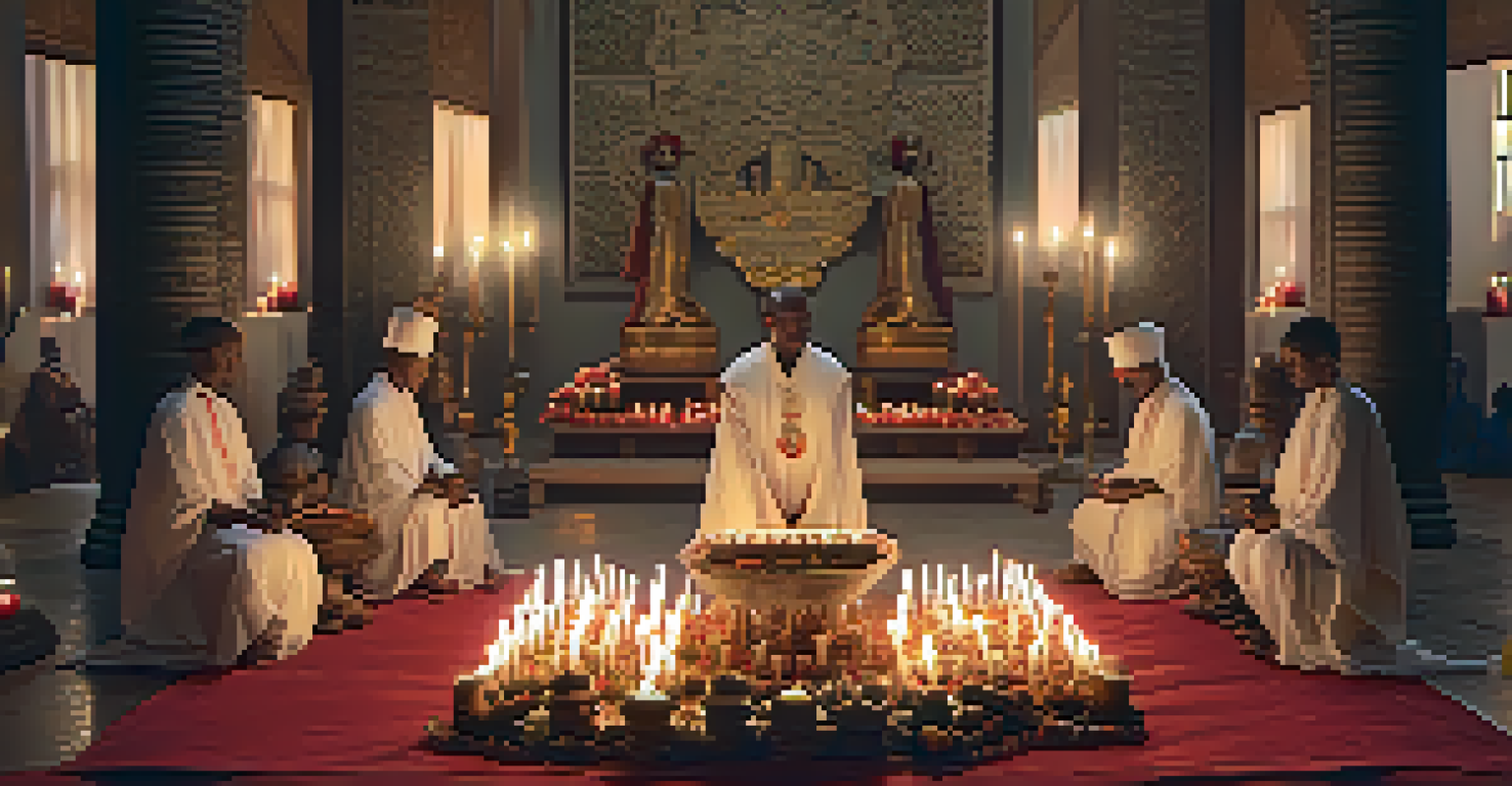African Heritage in Brazil: Music, Dance, and Religion

The Roots of African Heritage in Brazil
Brazil's African heritage is deeply intertwined with its history, particularly during the transatlantic slave trade. Millions of Africans were brought to Brazil, contributing to the country's rich cultural tapestry. This blend of traditions has shaped Brazil’s identity, making it a unique fusion of African, Indigenous, and European influences.
The African heritage is a vital part of Brazil's identity, from music and dance to food and religion. It tells the story of resilience and cultural pride.
Understanding this heritage requires a look back at the resilience of African cultures amidst adversity. Despite the harsh realities of slavery, African traditions found ways to survive and thrive. This ongoing influence is evident today in various aspects of Brazilian life, from cuisine to languages spoken.
The legacy of African heritage is not just historical; it continues to evolve. Contemporary Brazilian culture, especially in cities like Salvador and Rio de Janeiro, showcases vibrant expressions of this heritage, inviting both locals and tourists to immerse themselves in its beauty.
The Role of Music in African Heritage
Music is a vital expression of African heritage in Brazil, with genres like samba, bossa nova, and axé drawing heavily from African rhythms and instruments. These musical forms are not only entertaining but also serve as a means of storytelling and cultural preservation. Each beat resonates with the history and emotions of the African diaspora.

In particular, samba emerged from the Afro-Brazilian communities in Rio de Janeiro, combining African rhythms with local influences. Its vibrant beats and energetic movements reflect the spirit of celebration and resistance. During Carnaval, samba takes center stage, showcasing the power of music to unite and uplift communities.
Cultural Fusion Shapes Brazil's Identity
Brazil's identity is a unique blend of African, Indigenous, and European influences, deeply rooted in its history and ongoing cultural expressions.
Moreover, traditional African instruments like the berimbau and atabaque are integral to Brazilian music. They connect performers to their roots, creating a soundscape that honors the past while inviting innovation. This musical dialogue continues to inspire new generations of artists across Brazil.
Dance as a Cultural Expression
Dance is another essential aspect of African heritage in Brazil, with forms like capoeira and samba embodying the rhythm and movement of African traditions. Capoeira, a unique blend of martial arts and dance, originated from enslaved Africans who used it as a form of resistance and cultural expression. Today, it is a symbol of strength and community.
In Brazil, the rhythms, the colors, the flavors, and the beliefs of African heritage are not just remnants of the past; they are living expressions of a vibrant culture.
Samba, too, is much more than just a dance; it is a conduit of cultural identity. The lively samba schools prepare for Carnaval year-round, bringing together communities in a celebration of life, culture, and heritage. Each dance move tells a story, reflecting joy, struggle, and resilience.
These dances often incorporate elements from various African cultures, showcasing Brazil's diversity. Through dance, individuals express their identity and preserve their heritage, fostering a sense of belonging and pride within the community.
Religious Practices and Beliefs
Religion is a significant avenue through which African heritage manifests in Brazil, particularly through Candomblé and Umbanda. These Afro-Brazilian religions blend African spiritual practices with elements of Catholicism and Indigenous beliefs, creating a rich tapestry of faith. They emphasize the connection between the spiritual and physical worlds.
Candomblé, for instance, honors orishas, which are deities that represent various forces of nature and human experiences. Rituals often include music, dance, and offerings, creating a holistic experience that engages all senses. This practice not only strengthens community bonds but also serves as a form of resistance against cultural erasure.
Music and Dance Celebrate Heritage
Music and dance, particularly samba and capoeira, serve as vital expressions of African heritage, reflecting community, resistance, and cultural identity.
Umbanda, while similar to Candomblé, emphasizes a more syncretic approach, welcoming influences from various religious traditions. It highlights the adaptability and resilience of African spiritual practices in Brazil, showcasing how these beliefs continue to evolve while remaining grounded in their origins.
The Influence of African Heritage on Brazilian Cuisine
African heritage has significantly influenced Brazilian cuisine, introducing a variety of flavors and cooking techniques. Dishes like feijoada, a black bean stew with pork, have roots in African culinary traditions. This hearty meal is often enjoyed in communal settings, reflecting the importance of togetherness in African cultures.
Additionally, ingredients such as okra, palm oil, and various spices highlight the African influence in Brazilian cooking. These elements not only enhance flavor but also connect Brazilian dishes to their African origins. The fusion of various culinary traditions creates a unique gastronomic experience that tells a story of resilience and adaptation.
Street food, a beloved aspect of Brazilian culture, also showcases African influence. Snacks like acarajé, deep-fried balls made from black-eyed peas and filled with shrimp, are a testament to the rich culinary heritage that continues to thrive. This blend of flavors invites everyone to savor the history that shapes Brazil's food culture.
Celebrations and Festivals of African Heritage
Celebrations and festivals play a crucial role in honoring African heritage in Brazil, with events like the Festa de Iemanjá and the Olodum Carnival highlighting this rich cultural legacy. These festivals not only celebrate Afro-Brazilian culture but also serve as a platform to raise awareness about social issues affecting Afro-Brazilian communities.
The Festa de Iemanjá, held annually in Salvador, is a beautiful tribute to the goddess of the sea. Participants dress in white and offer flowers and gifts to the ocean, reflecting a deep reverence for African spirituality. This celebration fosters a sense of unity among participants and showcases the enduring connection to ancestral roots.
Cuisine Reflects African Influences
Brazilian cuisine, with dishes like feijoada and acarajé, showcases the rich flavors and cooking techniques brought by African heritage, celebrating communal ties.
Similarly, the Olodum Carnival embodies the vibrant spirit of Afro-Brazilian culture. With its rhythmic percussion and colorful parades, it invites people to engage with the rich traditions of the African diaspora. Through these celebrations, communities come together to honor their heritage and reinforce their cultural identity.
The Ongoing Impact of African Heritage in Brazil
The impact of African heritage in Brazil continues to resonate in contemporary society. Artists, musicians, and dancers draw inspiration from their roots, ensuring that the legacy of their ancestors remains vibrant and relevant. This cultural revival is essential not only for preserving history but also for fostering pride among younger generations.
Moreover, discussions around race and identity have gained prominence in Brazil, highlighting the importance of recognizing and celebrating African contributions to society. This dialogue encourages a deeper understanding of the complexities of Brazilian identity, paving the way for greater inclusivity and representation.

As Brazil moves forward, the celebration of African heritage serves as a reminder of the resilience and strength of its people. By embracing this rich cultural heritage, Brazil not only honors its past but also cultivates a future that values diversity and unity.